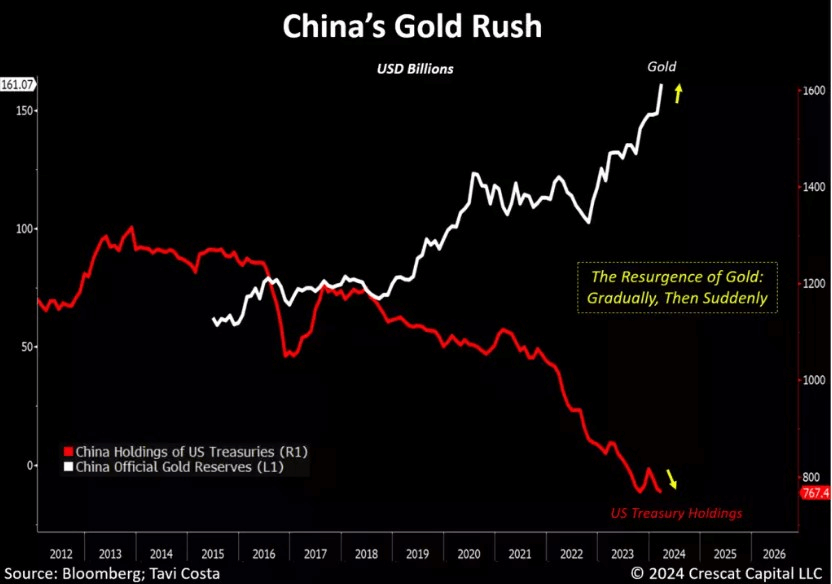The U.S. dollar, long considered the undisputed king of global currencies, might face a potential challenger.
China’s central bank, the People’s Bank of China (PBOC), has been quietly but steadily accumulating gold reserves for the past 17 months.
This aggressive gold-buying spree has sparked concerns among financial experts that China may be preparing to move away from its dependence on the U.S. dollar and could potentially destabilize its dominance in the global financial system.
This gold stockpile could be a ‘war chest’ shielded from U.S. sanctions, especially considering China’s growing assertiveness on the world stage and decreasing holdings of U.S. Treasuries, according to a research letter from investment firm Crescat Capital.
‘While the European Central Bank, the Bank of Japan, and other close US allies still maintain substantial holdings of Treasury securities, China, once the primary financier for the U.S., has unmistakably shifted its focus towards gold as its core holding,’ analysts wrote.

The ongoing pressure for China to devalue its currency is precisely why the country urgently needs to continue accumulating gold. In fact, China’s macroeconomic imbalances strengthen the argument for holding gold.
China dumps record amount of U.S. treasuries
In the first quarter of 2024, China sold a record-breaking $53.3 billion U.S. Treasuries and agency bonds. Traditionally a major holder of U.S. debt, China reduced its Treasury holdings by $22 billion during this period, with the rest of the offloaded assets being agency bonds.
China’s ongoing ‘de-dollarization’ strategy involves reallocating its U.S. Treasury holdings into other investments. Chinese assets in Belgium’s Euroclear and possibly in Luxembourg’s Clearstream or the UK suggest a strategy of diversification rather than a complete exit from U.S. debt.
While China is buying gold, it remains unclear if these purchases are funded by selling U.S. assets.
China isn’t the only country losing confidence in U.S. securities
But gold isn’t the only story. Central banks worldwide, including India, Russia, Turkey, and China, with a combined population of over 3 billion, are quietly reducing their holdings of U.S. assets like Treasury bonds. This shift reflects anxieties about America’s mounting debt and political volatility. While a recent dollar surge masks this trend, the underlying move toward diversification persists.
The future of the dollar’s dominance is unclear. It might erode, but a gradual shift towards other established currencies like the euro or yen seems more likely.
However, a sudden decline in the dollar’s value could have severe global repercussions, including higher interest rates in Europe and emerging economies struggling with dollar-denominated debt.
Investors should consider diversification tactics
This potential shift presents both challenges and opportunities. Investors in the West must be aware of the geopolitical landscape, particularly the U.S.-China relationship.
Diversification into a basket of currencies could offer some protection. Additionally, some see potential in the Japanese yen, which has become undervalued, or even the British pound, despite its smaller share than the renminbi.
While the dollar’s dethronement isn’t imminent, China’s actions and the broader diversification trend are a wake-up call. Investors who stay informed and adapt their strategies will be better positioned to navigate the potential changes in the global financial landscape.

